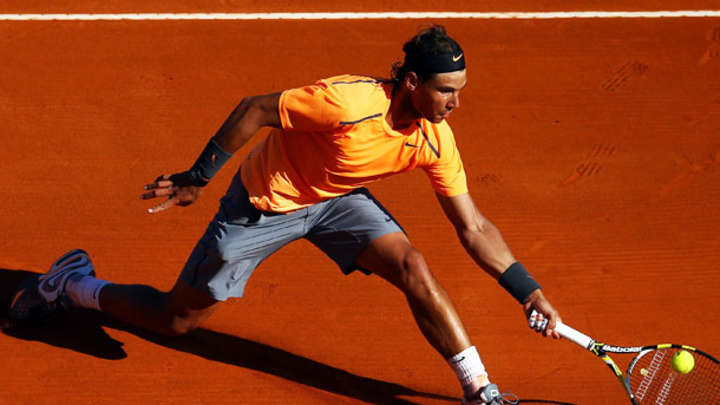Rafael Nadal out of London Olympics opens door for Roger Federer

Rafael Nadal, gold medalist at the 2008 Beijing Games, will not be defending his medal in London. (Getty Images)
The tennis world is still reeling from news that 2008 Beijing gold medalist Rafael Nadal has withdrawn from the London Olympics. Though his statement gave no official reason other than overall condition, reports are out that Nadal's withdrawal is due to the ongoing problems with his knees. The Spaniard is the only active player to complete the career Golden Slam and says he tried to rehabilitate and prepare as quickly as possible for the Olympics after his second-round exit from Wimbledon, but time simply ran out.
"I do not find myself in a condition to compete," he said. "It is one of the saddest moments of my career... I tried to hurry my preparations and training to the very last minute, but it was not to be.”
Reports out of Spain are that Nadal's spot will be taken by Feliciano Lopez, though the ITF has yet to confirm. Meanwhile, Spain will have to scramble to appoint a new flag-bearer for the opening ceremonies, which are eight days away.
Some thoughts on Nadal's withdrawal and what it means:
Curse of the knees. It's hard not to feel for Nadal. Given his love of the Olympics, his excitement to carry the Spanish flag at the opening ceremonies, and what would have been a shot at redemption on the Wimbledon grass, this must have been an agonizing decision for him to make. Which is precisely why concerns over his health for the summer hard-court season and the U.S. Open have justifiably spiked. Rafa's health has always been the go-to caveat when assessing his ability to continue his winning ways over the long haul.
The knees stopped him from being able to defend his Wimbledon title in 2009 and certainly hindered him in his surprise loss to Robin Soderling that year at the French Open. A leg injury put a stop to his attempt to capture the "Rafa Slam" at the Australian Open in 2011, and earlier this year he confessed that a freak knee injury almost forced him to withdraw from the Australian Open. Given his second-round exit at Wimbledon last month, Nadal would have had four weeks to rest his body for the Olympics. That that amount of time wasn't enough is worrisome.
Advantage, Roger Federer. Federer is already the presumptive favorite heading into the London Games and with no Nadal to stop him, the numbers say this is as close to a lock as the Games allow. With his rise to No. 1, Federer can't meet Djokovic before the final, and Nadal's withdrawal definitely increases the likelihood of that happening. Neither Federer nor Djokovic will have to go through two of the top three to win the gold.
That said, Nadal's absence has to buoy the field. Taking three sets off Federer on grass is virtually an impossible task, one that's rarely been done. But the Olympic format, wherein all matches before the final are played as best of three, actually hurts Federer. There's more random chance involved in a best of three shootout, especially on grass, and Federer's own stats prove that. He hasn't won a grass title lead-up tournament (again, played as best of three) since 2008, having lost to Lleyton Hewitt and Tommy Haas in the finals of Halle since then. So Nadal's absence is definitely a boon to Federer's chances to finally win a singles gold medal and complete the career Golden Slam, but the early rounds are going to be a minefield.
Olympics lose a bit of luster. I'm not entirely convinced tennis brings a whole lot of value to the competition side of things at the Olympics. After all, the tennis competition itself is just a watered down version of the sport's most prestigious tournaments, the Slams. But what it lacks in novelty or prestige it more than makes up for in star power. Before this morning, eight tennis players had been confirmed as flag-bearers for their respective countries (seven now that Nadal is out), thrusting the sport into the spotlight and (hopefully) making it a must-see event. In a marked change from how tennis' biggest names used to treat the Olympics, the sport's biggest stars will be there, elevating the value and prestige of the Games.

Contributor, SI.com Nguyen is a freelance writer for SI.com, providing full coverage of professional tennis both on and off the court. Her content has become a must-read for fans and insiders to stay up-to-date with a sport that rarely rests. She has appeared on radio and TV talk shows all over the world and is one of the co-hosts of No Challenges Remaining, a weekly podcast available on iTunes. Nguyen graduated from the University of California, Irvine in 1999 and received a law degree from the University of California, Davis in 2002. She lives in the Bay Area.